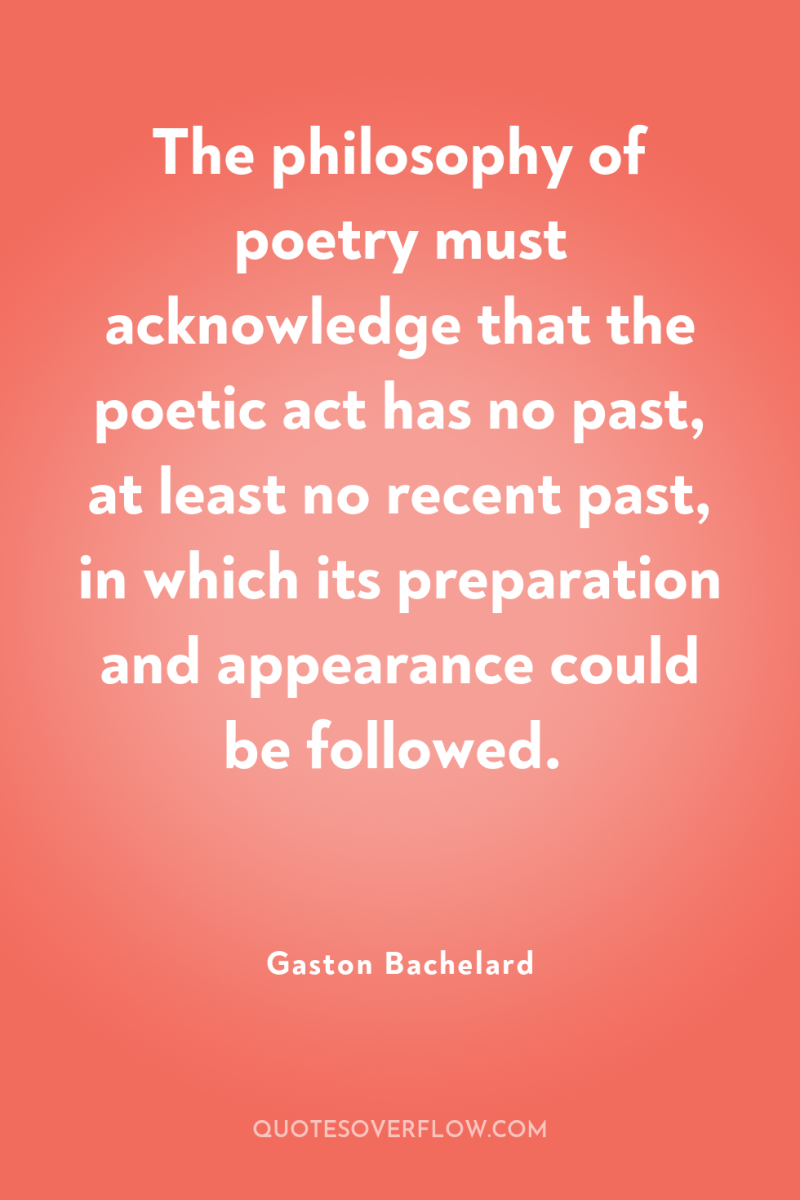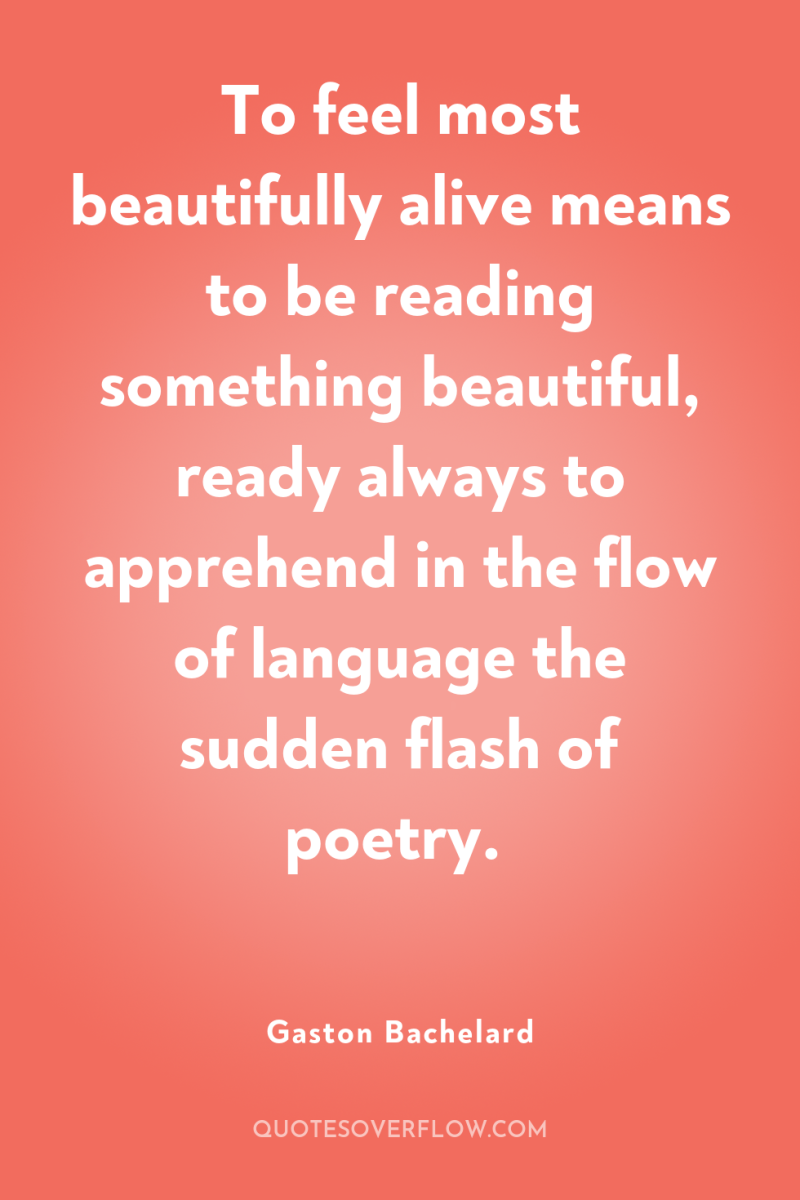
1
The philosophy of poetry must acknowledge that the poetic act has no past, at least no recent past, in which its preparation and appearance could be followed.Gaston Bachelard

2
To feel most beautifully alive means to be reading something beautiful, ready always to apprehend in the flow of language the sudden flash of poetry.Gaston Bachelard

3
We must listen to poets.Gaston Bachelard
4
Here is Menard's own intimate forest: 'Now I am traversed by bridle paths, under the seal of sun and shade... I live in great density... Shelter lures me. I slump down into the thick foliage... In the forest, I am my entire self. Everything is possible in my heart just as it is in the hiding places in ravines. Thickly wooded distance separates me from moral codes and cities.Gaston Bachelard
5
Here the phenomenologist has nothing in common with the literary critic who, as has frequently been noted, judges a work that he could not create and, if we are to believe certain facile condemnations, would not want to create. A literary critic is a reader who is necessarily severe. By turning inside out like a glove an overworked complex that has become debased to the point of being part of the vocabulary of statesmen, we might say that the literary critic and the professor of rhetoric, who know-all and judge-all, readily go in for a simplex of superiority. As for me, being an addict of felicitous reading, I only read and re-read what I like, with a bit of reader's pride mixed in with much enthusiasm. .Gaston Bachelard

6
A word is a bud attempting to become a twig. How can one not dream while writing? It is the pen which dreams. The blank page gives the right to dream.Gaston Bachelard
7
Sometimes the house of the future is better built, lighter and larger than all the houses of the past, so that the image of the dream house is opposed to that of the childhood home. Late in life, with indomitable courage, we continue to say that we are going to do what we have not yet done: we are going to build a house. This dream house may be merely a dream of ownership, the embodiment of everything that is considered convenient, comfortable, healthy, sound, desirable, by other people. It must therefore satisfy both pride and reason, two irreconcilable terms. .Gaston Bachelard
8
Rilke wrote: 'These trees are magnificent, but even more magnificent is the sublime and moving space between them, as though with their growth it too increased.Gaston Bachelard
9
Even a minor event in the life of a child is an event of that child's world and thus a world eventGaston Bachelard
10
Words are little houses, each with its cellar and garret. Common-sense lives on the ground floor, always ready to engage in "foreign commerce" on the same level as the others, as the passers-by, who are never dreamers. To go upstairs in the word house, is to withdraw, step by step; while to go down to the cellar is to dream, it is losing oneself in the distant corridors of an obscure etymology, looking for treasures that cannot be found in words. To mount and descend in the words themselves - this is a poet's life. To mount too high or descend too low, is allowed in the case of poets, who bring earth and sky together.Gaston Bachelard
11
Childhood is a human water, a water which comes out of the shadows. This childhood in the mists and glimmers, this life in the slowness of limbo gives us a certain layer of births. What a lot of beings we have begun! What a lot of lost springs which have nevertheless, flowed! Reverie toward our past then, reverie looking for childhood seems to bring back lives which which have never taken place, lives which have been imagined. Reverie is a mnemonics of the imagination. In reverie we re-enter into contact with possibilities which destitute has not been able to make use of.Gaston Bachelard
12
I should say: the house shelters day-dreaming, the house protects the dreamer, the house allows one to dream in peace.Gaston Bachelard
13
We comfort ourselves by reliving memories of protection. Something closed must retain our memories, while leaving them their original value as images. Memories of the outside world will never have the same tonality as those of home and, by recalling these memories, we add to our store of dreams; we are never real historians, but always near poets, and our emotion is perhaps nothing but an expression of a poetry that was lost.Gaston Bachelard
14
Of course, thanks to the house, a great many of our memories are housed, and if the house is a bit elaborate, if it has a cellar and a garret, nooks and corridors, our memories have refuges that are all the more clearly delineated. All our lives we come back to them in our daydreams. A psychoanalyst should, therefore, turn his attention to this simple localization of our memories. I should like to give the name of topoanalysis to this auxiliary of pyschoanalysis. Topoanalysis, then would be the systematic psychological study of the sites of our intimate lives.Gaston Bachelard
15
One must always maintain one’s connection to the past and yet ceaselessly pull away from it. To remain in touch with the past requires a love of memory. To remain in touch with the past requires a constant imaginative effort.Gaston Bachelard
16
How concrete everything becomes in the world of the spirit when an object, a mere door, can give images of hesitation, temptation, desire, security, welcome and respect. If one were to give an account of all the doors one has closed and opened, of all the doors one would like to re-open, one would have to tell the story of one's entire life.Gaston Bachelard
17
Therefore, the places in which we have experienced day dreaming reconstitute themselves in a new daydream, and it is because our memories of former dwelling-places are relived as day-dreams these dwelling-places of the past remain in us for all the time.Gaston Bachelard
18
Therefore, the places in which we have experienced daydreaming reconstitute themselves in a new daydream, and it is because our memories of former dwelling-places are relived as day-dreams that these dwelling-places of the past remain in us for all time.Gaston Bachelard
19
Would a bird build its nest if it did not have its instinct for confidence in the world?Gaston Bachelard
20
When the image is new, the world is new.Gaston Bachelard
21
A creature that hides and “withdraws into its shell, ” is preparing a “way out.” This is true of the entire scale of metaphors, from the resurrection of a man in his grave, to the sudden outburst of one who has long been silent. If we remain at the heart of the image under consideration, we have the impression that, by staying in the motionlessness of its shell, the creature is preparing temporal explosions, not to say whirlwinds, of being.Gaston Bachelard
22
For a knowledge of intimacy, localization in the spaces of our intimacy is more urgent than determination of dates.Gaston Bachelard
23
I am alone so I dream of the being who has cured my solitude, who would be cured by solitudes. With its life, it brought me the idealizations of life, all the idealizations which give life a double, which lead life toward it summits, which make the dreamer too live by splitting...Gaston Bachelard
24
Baudelaire writes: In certain almost supernatural inner states, the depth of life is entirely revealed in the spectacle, however ordinary, that we have before our eyes, and which becomes the symbol of it." Here we have a passage that designates the phenomenological direction I myself pursue. The exterior spectacle helps intimate grandeur unfold.Gaston Bachelard
25
Wolves in shells are crueler than stray ones.Gaston Bachelard
26
Reveries of idealization develop, not by letting oneself be taken in by memories, but by constantly dreaming the values of a being whom one would love. And that is the way a great dreamer dreams his double. His magnified double sustains him." - Gaston Bachelard, "Reveries on Reverie (Anima - Animus)", The Poetics of Reverie: Childhood, Language, and the Cosmos, Page 88Gaston Bachelard
27
Contemplating a flame perpetuates a primordial reverie. It separates us from the world and enlarges our world as dreamers. In itself the flame is a major presence, but being close to it makes us dream of far away, too far away. The flame is there, feeble and tiny, struggling to stay in existence, and the dreamer goes on to dream of elsewhere, losing his own being by dreaming on a grand, on a too grand scale by dreaming of the world. .Gaston Bachelard
28
So like a forgotten fire a childhood can always flare up again within us.Gaston Bachelard
29
The characteristic of scientific progress is our knowing that we did not know.Gaston Bachelard
30
The repose of sleep refreshes only the body. It rarely sets the soul at rest. The repose of the night does not belong to us. It is not the possession of our being. Sleep opens within us an inn for phantoms. In the morning we must sweep out the shadows.Gaston Bachelard
31
There is no original truth, only original error.Gaston Bachelard
32
A special kind of beauty exists which is born in language, of language, and for language.Gaston Bachelard
33
If I were asked to name the chief benefit of the house, I should say: the house shelters day-dreaming, the house protects the dreamer, the house allows one to dream in peace.Gaston Bachelard